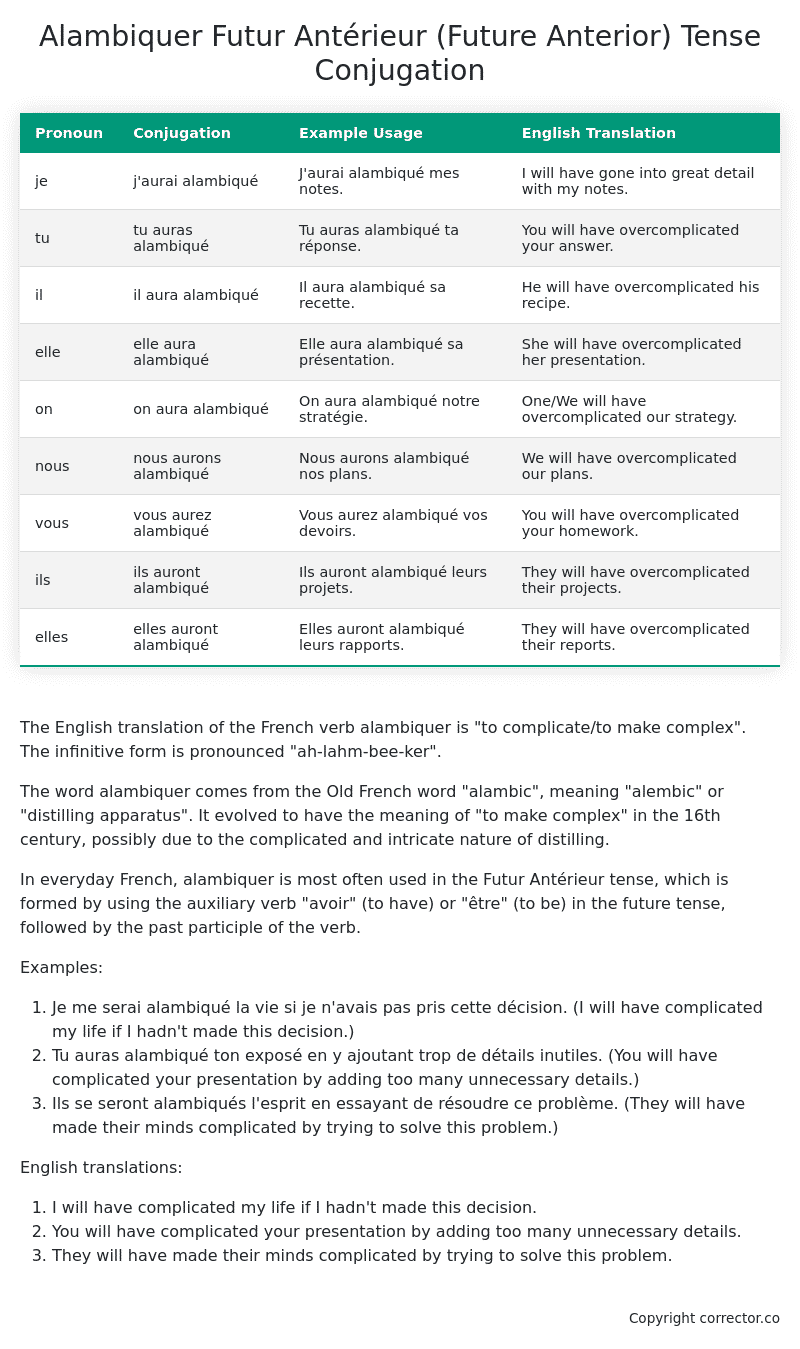Futur Antérieur (Future Anterior) Tense Conjugation of the French Verb alambiquer
Introduction to the verb alambiquer
The English translation of the French verb alambiquer is “to complicate/to make complex”. The infinitive form is pronounced “ah-lahm-bee-ker”.
The word alambiquer comes from the Old French word “alambic”, meaning “alembic” or “distilling apparatus”. It evolved to have the meaning of “to make complex” in the 16th century, possibly due to the complicated and intricate nature of distilling.
In everyday French, alambiquer is most often used in the Futur Antérieur tense, which is formed by using the auxiliary verb “avoir” (to have) or “être” (to be) in the future tense, followed by the past participle of the verb.
Examples:
- Je me serai alambiqué la vie si je n’avais pas pris cette décision. (I will have complicated my life if I hadn’t made this decision.)
- Tu auras alambiqué ton exposé en y ajoutant trop de détails inutiles. (You will have complicated your presentation by adding too many unnecessary details.)
- Ils se seront alambiqués l’esprit en essayant de résoudre ce problème. (They will have made their minds complicated by trying to solve this problem.)
English translations:
- I will have complicated my life if I hadn’t made this decision.
- You will have complicated your presentation by adding too many unnecessary details.
- They will have made their minds complicated by trying to solve this problem.
Table of the Futur Antérieur (Future Anterior) Tense Conjugation of alambiquer
| Pronoun | Conjugation | Example Usage | English Translation |
|---|---|---|---|
| je | j’aurai alambiqué | J’aurai alambiqué mes notes. | I will have gone into great detail with my notes. |
| tu | tu auras alambiqué | Tu auras alambiqué ta réponse. | You will have overcomplicated your answer. |
| il | il aura alambiqué | Il aura alambiqué sa recette. | He will have overcomplicated his recipe. |
| elle | elle aura alambiqué | Elle aura alambiqué sa présentation. | She will have overcomplicated her presentation. |
| on | on aura alambiqué | On aura alambiqué notre stratégie. | One/We will have overcomplicated our strategy. |
| nous | nous aurons alambiqué | Nous aurons alambiqué nos plans. | We will have overcomplicated our plans. |
| vous | vous aurez alambiqué | Vous aurez alambiqué vos devoirs. | You will have overcomplicated your homework. |
| ils | ils auront alambiqué | Ils auront alambiqué leurs projets. | They will have overcomplicated their projects. |
| elles | elles auront alambiqué | Elles auront alambiqué leurs rapports. | They will have overcomplicated their reports. |
Other Conjugations for Alambiquer.
Le Present (Present Tense) Conjugation of the French Verb alambiquer
Imparfait (Imperfect) Tense Conjugation of the French Verb alambiquer
Passé Simple (Simple Past) Tense Conjugation of the French Verb alambiquer
Passé Composé (Present Perfect) Tense Conjugation of the French Verb alambiquer
Futur Simple (Simple Future) Tense Conjugation of the French Verb alambiquer
Futur Proche (Near Future) Tense Conjugation of the French Verb alambiquer
Plus-que-parfait (Pluperfect) Tense Conjugation of the French Verb alambiquer
Passé Antérieur (Past Anterior) Tense Conjugation of the French Verb alambiquer
Futur Antérieur (Future Anterior) Tense Conjugation of the French Verb alambiquer (this article)
Subjonctif Présent (Subjunctive Present) Tense Conjugation of the French Verb alambiquer
Subjonctif Passé (Subjunctive Past) Tense Conjugation of the French Verb alambiquer
Subjonctif Imparfait (Subjunctive Imperfect) Tense Conjugation of the French Verb alambiquer
Subjonctif Plus-que-parfait (Subjunctive Pluperfect) Tense Conjugation of the French Verb alambiquer
Conditionnel Présent (Conditional Present) Tense Conjugation of the French Verb alambiquer
Conditionnel Passé (Conditional Past) Tense Conjugation of the French Verb alambiquer
L’impératif Présent (Imperative Present) Tense Conjugation of the French Verb alambiquer
L’infinitif Présent (Infinitive Present) Tense Conjugation of the French Verb alambiquer
Struggling with French verbs or the language in general? Why not use our free French Grammar Checker – no registration required!
Get a FREE Download Study Sheet of this Conjugation 🔥
Simply right click the image below, click “save image” and get your free reference for the alambiquer Futur Antérieur tense conjugation!

Alambiquer – About the French Futur Antérieur (Future Anterior) Tense
Construction
Common Everyday Usage Patterns
Interactions with Other Tenses
For example
Summary
I hope you enjoyed this article on the verb alambiquer. Still in a learning mood? Check out another TOTALLY random French verb conjugation!


